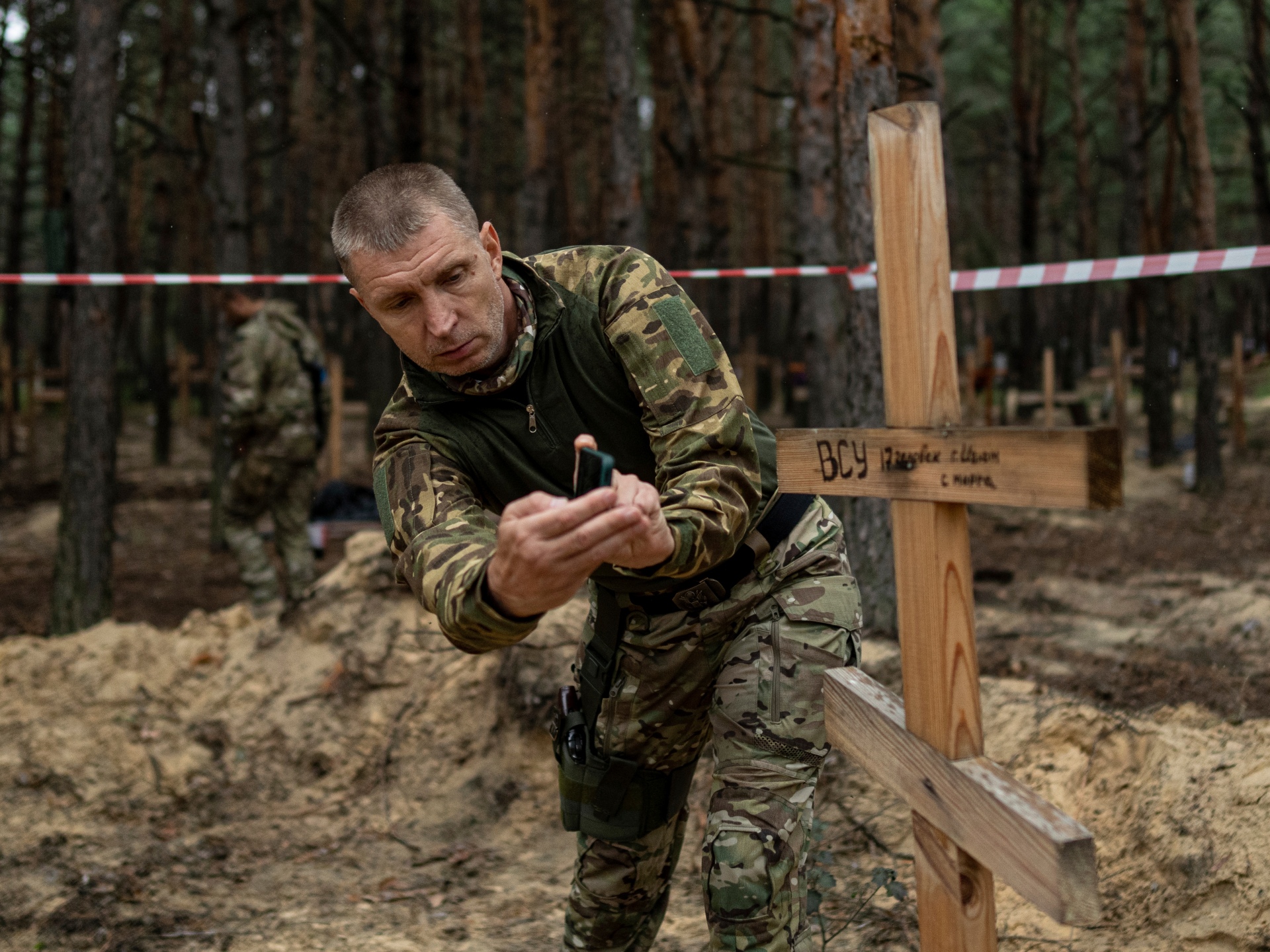Ukraine finds mass burial site in Izyum after Russians driven out

Volodymyr Zelenskyy says Russians ‘leaving death behind’ after more than 440 bodies discovered in northeastern town.
Ukrainian authorities have found a mass grave in woods near the northeastern town of Izyum, days after recapturing it from occupying Russian forces.
Ukraine’s President Volodymyr Zelenskyy revealed the discovery of the burial site — containing some 440 bodies — in his address to the country on Thursday night.
A regional police official said earlier that some of those killed had died in shelling or air raids.
“The necessary procedures have already begun there. More information – clear, verifiable information – should be available tomorrow,” said Zelenskyy, who had visited Izyum on Wednesday.
Journalists who travelled to the site described hundreds of graves marked with simple wooden crosses among the trees. A larger grave bore a marker saying it contained the bodies of 17 Ukrainian soldiers, according to the Associated Press news agency.
Investigators were using metal detectors to look for any hidden explosives.
“I can say it is one of the largest burial sites in a big town in liberated [areas] … 440 bodies were buried in one place,” Serhiy Bolvinov, the chief police investigator for the Kharkiv region, told the United Kingdom’s Sky News. “Some died because of artillery fire … some died because of air strikes.”
It was not possible to immediately verify the Ukrainian claims and there was no immediate response from Russia.
In his address, Zelenskyy invoked the killings in Bucha, on the outskirts of the capital Kyiv, where Ukrainians found bodies of civilians lying in the streets in early April after Russian soldiers withdrew. He also referenced the southern port city of Mariupol, where Ukraine says tens of thousands of civilians probably died in the Russian assault and prolonged siege.
“Bucha, Mariupol, now, unfortunately, Izyum. … Russia leaves death everywhere. And it must be held accountable for it. The world must bring Russia to real responsibility for this war,” he said.
Russia has denied targeting civilians or committing war crimes.
More US aid
Ukraine liberated Izyum after two weeks of rapid gains in the northeastern Kharkiv region. Ukrainian officials say since the start of the month, they have retaken about 9,000sq km (3,400sq miles) of their country’s territory, equivalent to the size of the island of Cyprus.
On Thursday, the United States moved to support the counteroffensive with a new package of military aid worth up to $600 million.
The White House said the package includes equipment and services, as well as training, but did not elaborate on the type of weapons it was providing. The US has provided more than $15bn in military assistance to Kyiv since Russia began its invasion on February 24.
Ukraine is hoping to push further before the weather turns significantly colder, but Russia has responded with a barrage of air raids, including firing eight cruise missiles at a dam near Kryvyi Rih, Zelenskyy’s hometown in central Ukraine. Some 100 homes were flooded as a result of the attack and work is currently under way to repair the damage.
In the newly-liberated Kharkiv region, Deputy Interior Minister Yevhen Enin said Ukrainian troops have also discovered multiple “torture chambers” where both Ukrainian citizens and foreigners were detained “in completely inhuman conditions”.
“We have already come across the exhumation of individual bodies, not only with traces of a violent death, but also of torture – cut off ears, etc. This is just the beginning,” Enin said in an interview with Ukraine’s Radio NV.
He said that among those held at one of the sites were students from an unspecified Asian country who were captured at a Russian checkpoint as they tried to leave for Ukrainian-controlled territory.
Enin did not specify where the group was held, although he named the small cities of Balakliia and Volchansk as two locations where torture chambers were found. His account could not be independently verified.
“All these traces of war crimes are now carefully documented by us. And we know from the experience of Bucha that the worst crimes can only be exposed over time,” Enin said,






